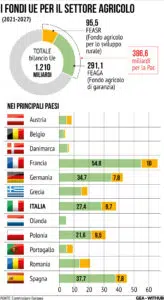Brussels – The ball is in the hands of the EU Parliament and Council, and “swift” action must now be taken, Commissioner for Agriculture Janusz Wojciechowski said. He urged the co-legislators to adopt the package of changes to the Common Agricultural Policy (CAP) the European Commission presented on Friday (March 15) to ease farmers’ administrative burdens after the strong protests involving the capitals of EU member states and Brussels: “Swift approval is essential so that farmers feel the effect of the changes already in 2024. Otherwise, it will only happen in 2025.”
 Speaking in the Agriculture and Rural Development (AGRI) Committee of the EU Parliament this morning (March 19), Commissioner Wojciechowski made it clear that with the changes to the CAP Strategic Plans Regulation, “we have listened to concerns and responded” on “important” issues such as administrative burdens, market disruptions, and lack of fairness in the supply chain. “Farmers can count on Europe’s support. The package is balanced and provides a meaningful response to the concerns expressed,” the office in charge of agriculture for the von der Leyen Cabinet added, noting, however, that it “maintains the overall orientation of the current CAP and its essential role in supporting the sustainable transition of European agriculture.” The goal is to “ensure a high level of ambition” since “a stable and predictable food system is needed for the years to come.”
Speaking in the Agriculture and Rural Development (AGRI) Committee of the EU Parliament this morning (March 19), Commissioner Wojciechowski made it clear that with the changes to the CAP Strategic Plans Regulation, “we have listened to concerns and responded” on “important” issues such as administrative burdens, market disruptions, and lack of fairness in the supply chain. “Farmers can count on Europe’s support. The package is balanced and provides a meaningful response to the concerns expressed,” the office in charge of agriculture for the von der Leyen Cabinet added, noting, however, that it “maintains the overall orientation of the current CAP and its essential role in supporting the sustainable transition of European agriculture.” The goal is to “ensure a high level of ambition” since “a stable and predictable food system is needed for the years to come.”
Responding to questions from MEPs, Commissioner Wojciechowski stressed that one of the central aspects is to allow member states to provide “temporary derogations from certain cross-compliance requirements” when “weather conditions prevent farmers from meeting the requirements, for example, deadlines in a given year.” Regarding ‘Good Agricultural and Environmental Conditions’ (BCAA), the flexibility provided on standard 7 (crop rotation) “may allow farmers affected by periodic drought or excessive rainfall to meet the condition in a way that is more compatible with the realities of farming.” In addition, eliminating standard 8 (fallow land) and establishing eco-schemes “would ensure that farmers are rewarded and incentivized for these practices while continuing to contribute to biodiversity goals.” In terms of easing administrative burdens, the EU commission member disclosed that“about 14 thousand responses have already arrived” since the launch of the ad hoc survey (open until April 8): “I invite all European farmers to participate.” Finally, the Agriculture Commissioner recalled that “the protests show that we need to take action to strengthen fairness” in the food supply chain and the immediate measures proposed – “of a non-legislative nature” – could be implemented “already in the coming weeks.”
What the proposed amendment to the CAP provides
After the temporary waiver through 2024 to uncultivated land, the Commission proposes to eliminate the allocation of “a minimum proportion of arable land to non-productive areas” from standard 8 of the ‘Good Agricultural and Environmental Conditions’ (BCAA) – that is, fallow land – “while maintaining the protection of existing landscape elements.” Member states are instead required to “establish an eco-scheme” offering support to farmers “to maintain a portion of arable land in a non-productive state or to create new landscape elements” (such as hedges or trees). Farmers will be “specifically rewarded for these non-productive areas that are beneficial to biodiversity on farmland and rural areas, more generally.” Member States will also be able to provide “specific exemptions” from the BCAA rules on standards 5, 6, and 7 (tillage management, ground cover, and fallow land) for situations that “are likely to be contrary to their objectives,” such as in the case of specific soil and subsoil conditions. More specifically, the Commission proposes to retain crop rotation (standard 7) but allow member states to “add the possibility of meeting this requirement through crop diversification,” a flexibility that should allow farmers “affected by regular drought or excessive rainfall” to meet the condition “in a way that is more compatible with agricultural realities.” 
Among the most significant changes is the proposal to exempt farms under 10 hectares from cross-compliance checks and sanctions, a measure that “affects 65 percent of beneficiaries” of the CAP but “only 10 percent of the total agricultural area,” the Commission said. “The aim is to alleviate the administrative burden related to controls, which is higher for small farms than for larger farms.” In other words–in addition to the general BCAA flexibilities — burden relief for small farmers with a maximum farm size of no more than 10 hectares of agricultural area will ensure that they do not have to “be checked for compliance with statutory management requirements,” since the exemption “would not significantly hinder the role of cross-compliance requirements in contributing to climate and environmental objectives.” In addition, the proposal also provides for an increase in the number of requests for amendments to the CAP Strategic Plan from one to two per year: “This is necessary to deal more quickly with the changing situations of farmers, including those caused by adverse climatic events,” the Commission specifies.
Regarding farmers’ remuneration and their position in the food supply chain, options for action will go in three directions. First, the Commission will launch an observatory on production costs, margins, and business practices in the agri-food supply chain – with representatives of all food supply chain sectors and representatives of member states and the Commission – whose first meeting “is scheduled for the summer.” Secondly, the Commission proposes strengthening the rules applicable to contracts that farmers enter into with the food industry or retail buyers through new options to the Regulation establishing a common market organization in agricultural products (CMO) and cross-border enforcement of rules against unfair trade practices. Finally, the Commission will conduct a “thorough evaluation” of the Directive on Unfair Trade Practices in the Food Supply Chain in force since 2021, with the first report delivered in the spring of 2024 and a more detailed evaluation to be presented in 2025 along with legislative proposals “if appropriate.”
English version by the Translation Service of Withub









